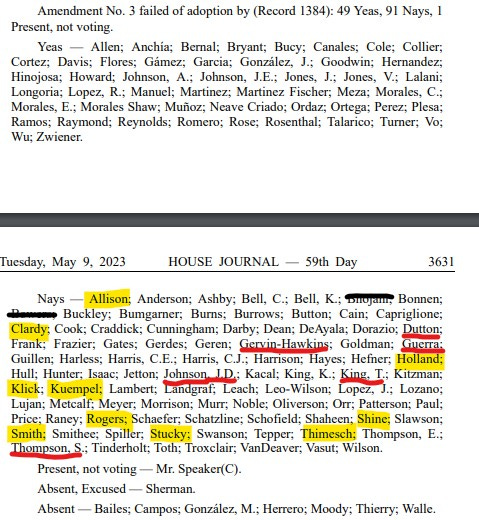Billionaire Battleground: How GOP Infighting Fuels The Case For Reform
Why Texas Republicans may rethink unlimited campaign contributions.
During the 88th Legislative Session, Representatives Vikki Goodwin (D-HD47) and Erin Zweiner (D-HD45) attempted to amend HB1585, which concerns campaign finance in Texas. The bill concerns the Texas Ethics Commission, which oversees state campaign finance laws. Still, it was the closest Democrats have come to debating the rampant corruption in Texas politics in recent years.
You can imagine how those amendments played out, but I’m betting some Republicans now regret their vote on these amendments.
Goodwin’s amendment would have capped campaign contributions in Texas at 50 times the federal limit. For the 2023-2024 election cycle, the federal campaign contribution limits were:
Individuals to candidates: $3,300.
x 50 = $165,000.
Individuals to PACs: $5,000.
x 50 = $250,000.
PACs to candidates: $5,000.
x 50 = $250,000.
Where did I get $500,000 before? I don’t remember, but this amendment would have capped campaign finance contributions to candidates at $165,000 and $250,000. It seems pretty reasonable. However, it didn’t pass. Let’s look at the votes.
Representatives Bhojani (D-HD92) and Bowers (D-113) are crossed out in black because the House journal later updated that they meant to press “yes” but accidentally pressed “no.” It happens; the buttons are right next to one another; it’s no big deal.
The Representatives underlined in red are Democrats who voted “no” with Republicans and did not ask the clerk to correct their vote in the journal. These included Harold Dutton (D-HD142), Barbara Gervin-Hawkins (D-HD120), Bobby Guerrera (D-HD41), Jarvis Johnson (D-HD139), Tracy King (D-HD80), and Senfronia Thompson (D-HD141). Note that neither Johnson nor King will return to office in the 89th.
If we’re serious about ending corruption and billionaire control of our government, campaign finance reform in some capacity has to happen.
But now I want to draw your attention to the highlighted names. These are all Republicans who voted against capping campaign contributions in 2023 but had obscene amounts of money spent to oust them in the 2024 primary race.
How much was spent to oust the Republicans who voted against capping campaign contributions?
Steve Allison (R-HD121): Allison’s Republican opponent, Marc Lahood, raised $2.6 million, including $862,000 from Greg Abbott, $513,000 from Texas Defense PAC, $298,000 from Texans for Lawsuit Reform, and $220,000 from Texans United for a Conservative Majority.
Travis Clardy (R-HD11): Clardy’s Republican opponent, Joanne Shofner, raised $1.3 million this last election cycle, including a $722,000 donation from Texans for Lawsuit Reform and $441,000 from Greg Abbott.
Justin Holland (R-HD33): Holland’s Republican opponent, Katrina Pierson, raised $888,000, including $319,000 from Texans United for a Conservative Majority and $264,000 from Greg Abbott.
Stephanie Klick (R-HD93): Klick’s Republican opponent, David Lowe, raised $466,000, including $385,000 from Texans United for a Conservative Majority.
John Kuempel (R-HD44): Kuempel’s Republican opponent, Alan Schoolcraft, raised $1.5 million, including a $965,000 donation from Greg Abbott.
Glenn Rogers (R-HD60): Roger’s Republican opponent, Mike Olcott, raised $544,000, including a $219,000 donation from Greg Abbott.
Hugh Shine (R-HD55): Shine’s Republican opponent, Hillary Hickland, raised $927,000, including $423,000 from Greg Abbott.
Reggie Smith (R-HD62): Smith’s Republican opponent, Shelley Luther, raised $468,000, including a $210,000 donation from Greg Abbott.
Lynn Stucky (R-HD64): Stucky’s Republican opponent, Andy Hopper, raised $1 million, including $457,000 from Texans United for a Conservative Majority and $220,000 from Darlene Pendry.
Kronda Thimesch (R-HD65): Thimesch’s Republican opponent, Mitch Little, raised $1.1 million, including $360,000 from Texans United for a Conservative Majority.
I wonder if, in 2023, someone told these ten Republicans that voting for a campaign contribution cap would have saved their seats if they would have still voted against it.
It should be noted that while Frederick Frazier (R-HD61) and Jacey Jetton (R-HD26) were also ousted this cycle, neither of their opponents had any contributions over $165,000.
After such an ugly Republican primary season, where so many Republicans lost their seats because of the mountains of money spent against them while the Republicans are fighting such a vicious civil war, is now the time to push for campaign finance reform?
How many votes are needed in the House for campaign finance reform?
The House would need 76 votes to pass campaign finance reform. Whether it’s something similar to what Vikki Goodwin proposed or a solid dollar number, most Texans agree that we should remove billionaires from our government.
That said, passing it through the Texas Senate, led by Dan Patrick, and getting it signed by Governor Greg Abbott is another can of worms. But who knows what could happen if there is enough public support for campaign finance reform?
Getting all the Democrats in the House on board should be easy if the Democratic Caucus decides on it together. Considering that Democrats currently have Republicans by the short and curlies over the Speaker’s race, asking for a cap may get some traction, even if it’s a large one.
While a cap of $10,000 would never get past Dan Patrick or Greg Abbott, perhaps something higher, like $250,000, may get through the Senate. Abbott would be hard to get on board, considering this cycle alone, he’s received 47 contributions over $250,000, many of them in the millions. Maybe separate stipulations for statewide races?
Regardless, Democrats in the House are most likely to get at least 14 Republicans on their side because, right now, any Republican who works in a bipartisan fashion is threatened with a primary race. That means Tim Dunn will spend the money he has to oust them in the next election.
For these Republicans, voting in favor of a cap on campaign contributions could save their seats in the 2026 primary election. That’s how it has to be presented to them.
If Democrats can get some cap, even a high one, in future legislative sessions, they may be able to lower it, further removing billionaires from the election process.
Here are some bills that have already been filed to reform campaign finances:
HB1080, by Erin Zweiner (D-HD45), would establish campaign contribution limits for candidates running for statewide office or legislative positions in Texas.
HB1447, by Vikki Goodwin (D-HD47), is nearly identical to the amendment we discussed, which increases the cap to 50 times the federal level.
HB1613, by Ann Johnson (D-134), would restrict political contributions during regular legislative sessions and cover special legislative sessions.
SB405, by Mayes Middleton (R-SD11), only applies to donations from out of state, but it limits them and is still a step in the right direction.
Campaign finance reform isn’t just a Democratic issue—it’s a lifeline for the survival of many Republicans caught in the crossfire of their own party’s internal power struggles.
The staggering sums of money funneled into ousting incumbents in the 2024 Republican primaries demonstrate how dire the situation has become. If even a modest contribution cap could shield vulnerable members from these attacks, this argument should resonate across party lines.
The fight for reform is uphill, especially in a state where billionaires like Tim Dunn and organizations like Texans for Lawsuit Reform wield immense influence. But the growing discontent among voters—Democrats, independents, and even some Republicans—suggests that public support for reform could shift the political calculus.
Texas Democrats, with their newfound leverage in the House, have a unique opportunity to lead this charge. By framing campaign finance reform as a safeguard for democracy—and a pragmatic solution for Republicans who want to protect their seats—they might turn the tide. A reasonable cap, even a high one, could begin a larger movement to curb billionaire control and return power to everyday Texans.
The question now is whether lawmakers are willing to prioritize the integrity of the electoral process over the demands of their deep-pocketed donors. Time will tell, but one thing is certain: the cost of inaction is far greater than the price of reform.
January 14: The 89th Legislative Session begins.
March 14: The last day Legislators can file bills.
June 2: The 89th Legislative Session ends.
LoneStarLeft is a reader-supported publication. To receive new posts and support my work, consider becoming a free or paid subscriber.
Follow me on Facebook, TikTok, Threads, YouTube, and Instagram.






Thanks for a very informative article. Isn’t it true that for federal elections, there’s no limit on contributions to Super PACs, thanks to the Supreme Court decision in Citizens United, and the same goes for unlimited spending by the latter to support a candidate? Perhaps there are some restrictions on their coordination with the candidate. This is how Musk spent $277 million to get Trump reelected. So how do you propose handling such unlimited contributions and spending for Texas State elections?
well in this instance maybe they can arm, enlist and pay for this war Tump is imaging...
Trump and his Regent Elon may have a 'Special Military Operation' in Mexico ahead- DK